Russia-Ukraine war latest: Ukraine offers unconditional talks on Mariupol as west warns of Russian cyber-attacks – live | Ukraine
Ukraine proposes negotiations with Russia in Mariupol
Ukraine is ready to resolve the issue of unblocking Mariupol and evacuating civilians through diplomacy and has proposed to hold a “special round” of negotiations with Russia in the besieged city, officials said.
Ukraine negotiator and presidential aide Mykhailo Podolyak responded late on Wednesday:
Yes. Without any conditions. We’re ready to hold a ‘special round of negotiations’ right in Mariupol.
One on one. Two on two. To save our guys, Azov, military, civilians, children, the living & the wounded. Everyone. Because they are ours. Because they are in my heart. Forever,” he tweeted.
Yes. Without any conditions. We’re ready to hold a “special round of negotiations” right in Mariupol. One on one. Two on two. To save our guys, Azov, military, civilians, children, the living & the wounded. Everyone. Because they are ours. Because they are in my heart. Forever.
— Михайло Подоляк (@Podolyak_M) April 20, 2022
Another key Ukrainian negotiator, David Arakhamia, said on Telegram that he and Podolyak “are ready to arrive in Mariupol to hold talks”.
Today, in a conversation with the city defenders, a proposal was put forward to hold direct negotiations, on site, on the evacuation of our military garrison.
For our part, we are ready to arrive for such negotiations at any time as soon as we receive confirmation from the Russian side.”
As yet another desperate attempt to evacuate civilians from Mariupol failed Wednesday, Ukrainian President Volodymyr Zelensky warned that “the situation in Mariupol is deteriorating” with thousands of troops and civilians stuck in the city.
Zelenskiy said his country is ready to resolve the issues in Mariupol but Russia has “not yet shown readiness to take such a step” during a meeting with media representatives after talks with President of the European Council Charles Michel in Kyiv.
“The situation in Mariupol is deteriorating. Unfortunately, so far we cannot achieve a positive result there. Our warriors have hundreds of wounded. Protecting ordinary civilians with their backs, they lose their lives. Because, as far as I know, there are about a thousand civilians behind our guys in Mariupol, including children and women,” Zelenskiy said.
US President Joe Biden is set to announce plans on Thursday to send additional military aid to help Ukraine fight back against the Russian invasion, according to a US official.
The official, who was not authorised to comment publicly and spoke to the Associated Press on the condition of anonymity, said Biden will deliver a Thursday morning address at the White House detailing his plans to build on the roughly $2.6bn in military assistance the administration has already approved for Ukraine.
The new package is expected to be similar in size to the $800m package Biden announced last week.
It includes much needed heavy artillery and ammunition for Ukrainian forces in the escalating battle for the Donbas region of eastern Ukraine.
“I don’t know about you, but I’ve been to Ukraine a number of times before the war … and I knew they were tough and proud but I tell you what: They’re tougher and more proud than I thought,” Biden told military commanders. “I’m amazed at what they’re doing with your help.”
China reiterates opposition to unilateral sanctions
Chinese President Xi Jinping has reiterated China’s opposition to unilateral sanctions and “long-arm jurisdiction,” and said that “de-coupling” and pressure tactics such as cutting off of supply chains will not work.
China has repeatedly criticised western sanctions, including those against Russia over its invasion of Ukraine, but has also been careful not to provide assistance to Moscow that could lead to sanctions being imposed on Beijing.
During a video speech to the annual Boao Forum for Asia gathering on the southern Chinese island of Hainan, Xi also said that efforts are needed to stabilise global supply chains, but also said China’s economy is resilient and that its long-term trend had not changed.
Today’s Guardian Today in Focus podcast asks: Can Russia succeed as a new chapter of war begins in Ukraine?
Ukraine’s army held off Putin’s forces and stopped a Russian takeover of Kyiv in the first phase of the war. But, as Luke Harding reports, Russia’s approach in this next stage looks very different
Now, Putin’s focus is largely on winning territory in the east of the country.
In terms of military might, Russia appears to hold the advantage. But in the messy, grinding weeks ahead, will its forces be able to sustain the resources and willpower necessary to grasp victory?
A senior Kyiv official accused the International Committee of the Red Cross of working “in concert” with Russia in Ukraine, a charge the organisation has denied.
Ombudswoman Lyudmyla Denisova decried ICRC’s announcement last month that it was planning to open a branch in Russia’s southern Rostov region to help Ukrainian refugees, who, Kyiv says, have been forcibly deported to Russia.
“The International Red Cross is not fulfilling its mandate, I am certain of that,” Denisova said on Ukrainian television Wednesday after meeting with the head of the ICRC’s Ukrainian branch, AFP reports.
Citing data from the United Nations, Denisova said that some 550,000 Ukrainians, including 121,000 children, have been taken to Russia during the course of the war, but Kyiv has no information on who these people are and where they are being kept.
“Where are they? In filtration camps? In temporary facilities?” Denisova asked.
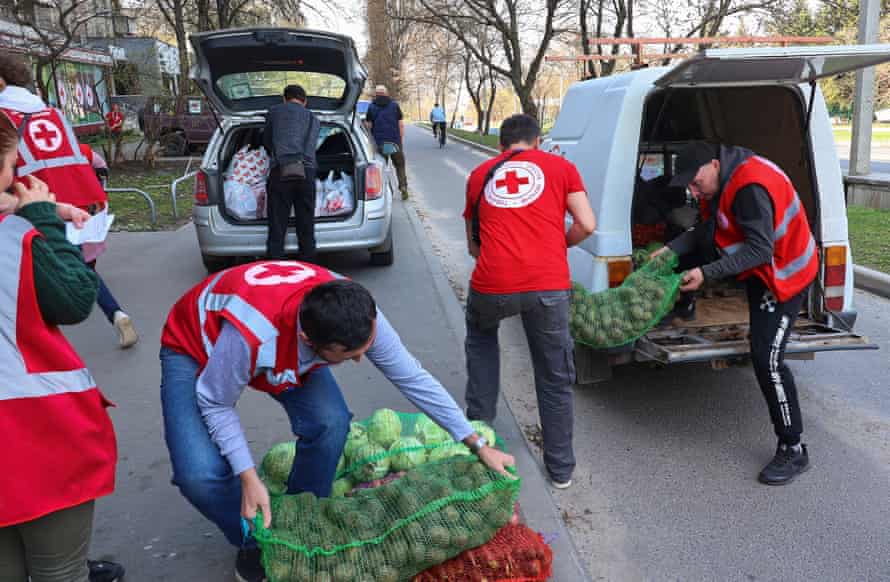
The official said she had asked both her Russian counterpart Tatyana Moskalkova and the ICRC for help in getting information on these refugees so that Ukraine could facilitate their return home, but had received “zero answer from her or from the Red Cross”.
Asked by the TV anchor whether Denisova suspected that the Red Cross was working “in concert” with Russia, Denisova replied: “Yes, I suspect they are.”
The ICRC strongly rejected Kyiv’s accusations.
“The ICRC does not ever help organise or carry out forced evacuations. We would not support any operation that would go against people’s will and international law,” the organisation said in a statement to AFP.
It added: “Building and maintaining a dialogue with parties to a conflict is essential to get access to all people affected and obtain necessary security guarantees for our teams to deliver life-saving aid.”
The Red Cross said it has been exploring the possibility to open an office in southern Russia.
“Our sole objective is to alleviate the suffering of the people affected by the armed conflict. And the suffering right now is simply immense.”
Here is an inside look at a settlement for displaced people in Lviv, Ukraine.
Houses were provided by the Polish government.
“Here we can be just by ourselves, we have real beds, and it’s warm,” Viktoria, a 39-year-old kindergarten administrator, told AFP.
Polish Prime Minister Mateusz Morawiecki made a visit to the new settlement on Tuesday, saying it could welcome up to 350 people.
“There will be more of these villages. In Lviv alone, they will accommodate 5,000 people,” he said, adding that plans were afoot to build similar settlements in ravaged towns retaken from the Russians outside the capital Kyiv.
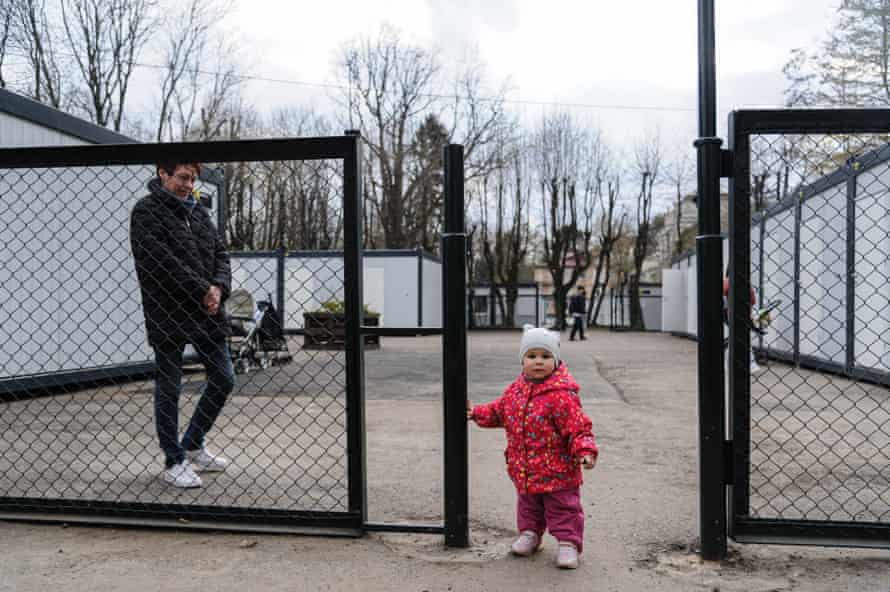
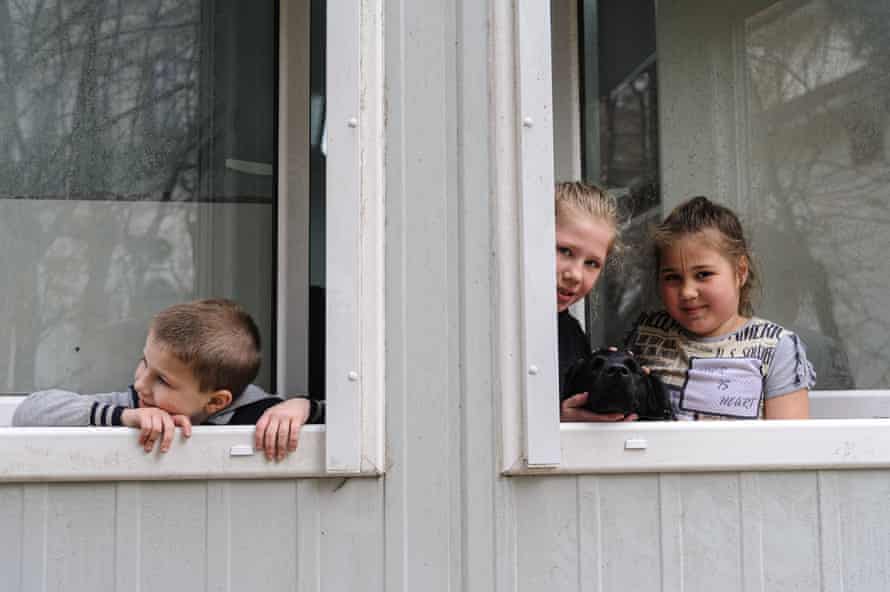
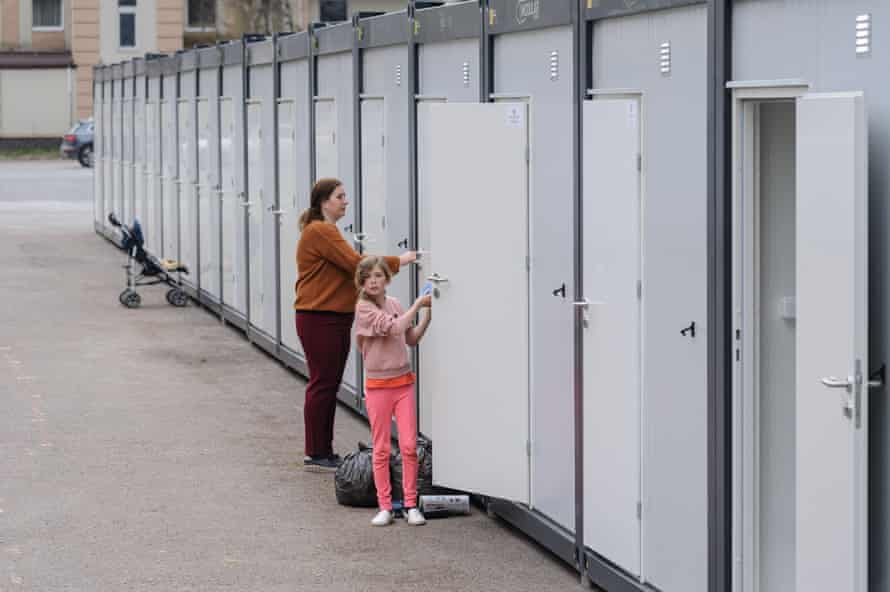
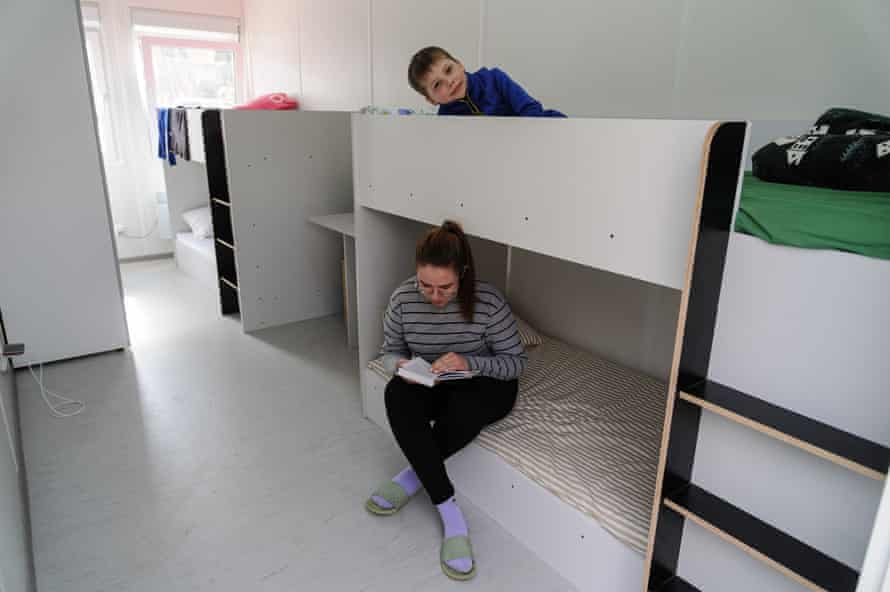
Russia controls 80% of territory in Luhansk, the head of the Luhansk regional military administration has said.
Serhiy Gaidai said in an update posted to his official Facebook account:
Yes, 80% of our territories are now controlled by [Russians]. Kremínna under [Russian control], Rubížne and Popasna. The fights are going on.”
Gaidai added that morgues and hospitals in the temporarily occupied territories are crowded.
“Luhansk land is full of corpses of enemies,” he said.
Germany will phase out Russian oil imports “by the end of the year” foreign minister Annalena Baerbock has said.
Speaking at a news conference in Riga with Baltic foreign ministers, Baerbock reiterated that coal imports would be phased out by the end of the summer. Gas imports would be phased out over a longer timeframe, she added.
I therefore say here clearly and unequivocally yes, Germany is also completely phasing out Russian energy imports.
We will halve oil by the summer and will be at 0 by the end of the year, and then gas will follow, in a joint European roadmap, because our joint exit, the complete exit of the European Union, is our common strength.”
G7 finance ministers said they have provided and pledged together additional support to Ukraine exceeding $24bn for 2022 and beyond, adding that they were prepared to do more as needed.
In a statement seen by Reuters, the ministers said they regretted Russia’s participation in international forums, including G20, International Monetary Fund and World Bank meetings this week.
“International organisations and multilateral fora should no longer conduct their activities with Russia in a business-as-usual manner,” the ministers said.
Summary
- Ukraine is ready to offer unconditional talks on Mariupol and has proposed to hold a “special round” of negotiations with Russia in the besieged city, officials said. “Without any conditions. We’re ready to hold a ‘special round of negotiations’ right in Mariupol,” Ukraine negotiator and presidential aide Mykhailo Podolyak tweeted. Another key Ukrainian negotiator, David Arakhamia, said he and Podolyak “are ready to arrive in Mariupol to hold talks” and “a proposal was put forward to hold direct negotiations, on site, on the evacuation of our military garrison.”
- Meanwhile, Ukraine’s president Zelenskiy said the situation in Mariupol is deteriorating with roughly 1,000 civilians remaining trapped in the city’s Azocstal steel plant, hiding there with the remaining fighters, who are heavily outnumbered. Zelenskiy said 120,000 people were being kept in Mariupol and that “crimes that are happening there are far more scary and large scale than in Borodyanka”, referencing a devastated Ukrainian town.
- A Ukrainian marine commander fighting in Mariupol has said his forces are “maybe facing our last days, if not hours”, as another Russian ultimatum to the remaining Ukrainian troops in the city to surrender or die expired with no mass capitulation. “The enemy is outnumbering us 10 to one,” Serhiy Volyna, a commander from the 36th separate marine brigade, said in a video message.
- Intelligence indicates Russia is poised to launch powerful cyberattacks against rivals supporting Ukraine, members of the ‘Five Eyes’ intelligence sharing network – the US, Britain, Canada, Australia and New Zealand – have warned. “Evolving intelligence indicates that the Russian government is exploring options for potential cyberattacks,” the group said in a statement.
- Putin ally Ramzan Kadyrov said Russian forces would be in complete control of the Azovstal steel plant in Mariupol “before lunchtime, or after lunch” on Thursday. The head of Russia’s republic of Chechnya made the claim in an audio message posted online early on Thursday as seen by Reuters.
- Ukraine is working to convince western allies to shift Russia’s shipments of natural gas from the Nord Stream 1 pipeline to Ukraine’s pipeline, increasing Kyiv’s leverage in its conflict with Russia, energy officials told Reuters.
- Italy has signed a deal with Angola to ramp up gas supplies in a bid to break away from Russian gas. In an interview with the Corriere della Sera, Prime minister Mario Draghi said: “We do not want to depend on Russian gas any longer, because economic dependence must not become political subjection.”
- The US defence department retracted its claim that Ukraine had been supplied with more aircraft, instead saying only parts had been delivered to enable Kyiv to put more jets into the fight against Russia. A senior US defence official added 14 US howitzers were now being delivered to the region, along with ammunition for them.
- White House press secretary Jen Psaki said the US is “working around the clock to provide security assistance to Ukraine” as five flights with military assistance arrived in the region over the last few days, with more than half a dozen flights from the US scheduled to arrive shortly with more equipment.
- The US also imposed sanctions on dozens of people and entities, including a Russian commercial bank and a virtual currency mining company with the aim “to target Moscow’s evasion of existing sanctions over Russia’s invasion of Ukraine”.
- Germany has defended itself against criticism that its delay in authorising the delivery of heavy weapons to Ukraine. Foreign minister Annalena Baerbock agreed to a swap system whereby Germany would help refill the gaps in the arsenal of Nato and G7 states after saying Germany has has run out of military hardware it can dispatch swiftly without undermining its own security commitments.
- Russia said it had test-launched its Sarmat intercontinental ballistic missile, a new addition to its nuclear arsenal. “This truly unique weapon will strengthen the combat potential of our armed forces, reliably ensure Russia’s security from external threats and provide food for thought for those who, in the heat of frenzied aggressive rhetoric, try to threaten our country,” Putin said.
- Zelenskiy spoke of his “cautious optimism” that Ukraine’s partners now better understand the needs of his country, seemingly in reference to supplying weapons and intensifying sanctions on Russia.
- Ukraine can develop “maximum speed” in joining the EU, Zelenskiy said in a national address Wednesday evening after meeting with the president of the European council, Charles Michel. “This is the historic moment when we can develop maximum speed in joining the European Union,” he said.
- UK prime minister Boris Johnson likened Russian president Vladimir Putin to a crocodile, saying he is not optimistic that the Russian leader can be negotiated with. “How can you negotiate with a crocodile when it has your leg in its jaws, that is the difficulty that Ukrainians face. It is very hard to see how the Ukrainians can negotiate with Putin now given his manifest lack of good faith,” he told journalists.
- United Nations Secretary-General Antonio Guterres has separately asked Russian President Vladimir Putin and Ukrainian President Volodymyr Zelenskiy to receive him to discuss steps to bring about peace.
- Finance ministers from the UK, US, Canada and France walked out of Wednesday’s G20 meeting as Russian representatives spoke, exposing deepening divisions over Russia’s continued presence in the body.
- A small but growing number of top Kremlin insiders are reportedly questioning President Vladimir Putin’s decision to invade Ukraine, according to Bloomberg. Some senior Kremlin insiders believe Russia’s invasion of Ukraine was a “catastrophic mistake that will set the country back for years”, the channel cited multiple sources as saying.
- More than 5 million people have fled Ukraine since Russian troops invaded the country on 24 February, according to figures by the UN’s refugee agency (UNHCR). Women and children account for 90% of those who have fled. A further 7.1 million people are displaced inside Ukraine.
Imprisoned Russian opposition leader Alexei Navalny has also spoken out against far-right French presidential candidate Marine Le Pen’s alleged ties to Russia in a long Twitter thread late on Wednesday.
“This bank is a well-known money-laundering agency created at the instigation of Putin,” Navalny tweeted, without citing evidence other than his own investigations into corruption in Russia. “This is selling political influence to Putin.”
1/16 Осознаю иронию ситуации: русский политзэк обращается к избирателям Франции. Но технически я в тюрьме по заявлению французской компании, в университете я учил 🇫🇷, а, приезжая в Париж в любую погоду, ношу шарф. Так что страна мне близка, и я попробую.
— Alexey Navalny (@navalny) April 20, 2022
French President Emmanuel Macron has accused his far-right rival Marine Le Pen of being in thrall to Russian President Vladimir Putin over a years-old Russian bank loan to her party during a fiery debate ahead of Sunday’s election.
Macron’s strongest lines of attack were on a well-publicised loan to her party for its 2017 campaign contracted through a Russian bank.
“You depend on the Russian power, you depend on Mr. Putin,” Macron told his opponent.
“A lot of your choices can be explained by this dependence,” he said in an attack on Le Pen’s policy positions.
“You cannot defend the interests of France because your interests are linked to Russian powers,” Macron said. “In 2015 you took out a loan with a Russian bank and you still have not paid it back.”
Le Pen dismissed the charge of being compromised politically by the Russian bank loan.
“He knows I am a free woman, I am a patriot. I have always defended France and the French. Always and in all circumstances,” she said.
United Nations Secretary-General Antonio Guterres has separately asked Russian President Vladimir Putin and Ukrainian President Volodymyr Zelenskiy to receive him to discuss steps to bring about peace.
UN spokesman Stephane Dujarric said separate letters were handed to the permanent missions of Russia and Ukraine on Tuesday afternoon asking Putin to receive Guterres in Moscow and Zelenskiy to receive him in Kyiv, according to a Reuters report.
“The Secretary-General said, at this time of great peril and consequence, he would like to discuss urgent steps to bring about peace in Ukraine and the future of multilateralism based on the Charter of the United Nations and international law,” Dujarric said in a statement.
A senior US defence official said 14 US howitzers that Washington said last week would be provided to Ukraine were now being delivered to the region, along with ammunition for them.
Around 50 Ukrainians are being trained outside of Ukraine to operate them, the official said.
“They will get trained on how to use the howitzers and then they’ll be able to go back in to Ukraine and train their colleagues,” the official said.
The US defence department has retracted its claim that Ukraine had been supplied with more aircraft, instead saying only parts had been delivered to enable Kyiv to put more jets into the fight against Russia.
Pentagon spokesman John Kirby retracted his statement from Tuesday that Ukraine had received fighter jets from an unnamed ally.
While fixed-wing aircraft have been offered by an unidentified country to bolster Kyiv’s defences, “they have not received whole aircraft from another nation,” Kirby told reporters.
“I was mistaken. They have not received whole aircraft from another nation,” Kirby said of his Tuesday claim.
“That said, Ukrainians have received through United States coordination and provision enough spare parts and additional equipment such that they have been able to put in operation more fixed-wing aircraft in their fleet than they had even two to three weeks ago,” he said.
Separately, a senior US defence official said the parts supply has enabled Ukraine to add 20 previously inoperable jets to its active fighter fleet.
Intel suggests looming Russian cyberattack, US and allies say
Five allied countries including the United States have warned that “evolving intelligence” indicates Russia is poised to launch powerful cyberattacks against rivals supporting Ukraine.
The members of the “Five Eyes” intelligence sharing network – the US, Britain, Canada, Australia and New Zealand – said Moscow could also involve existing cybercrime groups in launching attacks on governments, institutions and businesses, in a statement released on Wednesday.
“Evolving intelligence indicates that the Russian government is exploring options for potential cyberattacks,” they said in an official cyber threat alert.
Russia’s invasion of Ukraine could expose organisations both within and beyond the region to increased malicious cyber activity. This activity may occur as a response to the unprecedented economic costs imposed on Russia as well as materiel support provided by the United States and US allies and partners.
In addition, it said, “some cybercrime groups have recently publicly pledged support for the Russian government. “
“Some groups have also threatened to conduct cyber operations against countries and organisations providing materiel support to Ukraine,” it said.
Wednesday’s alert said Russian state-sponsored cyber actors have the ability to compromise IT networks, to steal large amounts of data from them while remaining hidden, to deploy destructive malware and to lock down networks with “distributed denial of service” attacks.
The alert identified more than a dozen hacking groups, both parts of Russian intelligence and military bodies and privately operated, which present threats.
It warned that infrastructure could be particularly targeted in countries Moscow might want to take action against.
US, Australian, Canadian, New Zealand, and UK cybersecurity authorities urge critical infrastructure network defenders to prepare for and mitigate potential cyber threats – including destructive malware, ransomware, DDoS attacks, and cyber espionage – by hardening their cyber defences and performing due diligence in identifying indicators of malicious activity,” the alert said.
US Cybersecurity and Infrastructure Security Agency Director Jen Easterly malicious cyber activity is “part of the Russian playbook”.
We also know that the Russian government is exploring options for potential cyberattacks against US critical infrastructure.”
“Russia has significant cyber capabilities and a demonstrated history of using them irresponsibly, and state-sponsored malicious cyber activity is a real risk to organisations around the world,” Sami Khoury, Head, Canadian Centre for Cyber Security, added.
Ramzan Kadyrov, the head of Russia’s republic of Chechnya, said Russian forces would be in complete control of the Azovstal steel plant in Mariupol on Thursday.
“Before lunchtime, or after lunch, Azovstal will be completely under the control of the forces of the Russian Federation,” he said in an audio message posted online early on Thursday as seen by Reuters.
Chechen forces have been fighting in Ukraine as part of Russia’s military operation.
Mariupol would be the biggest city to be seized by Russia since invading Ukraine eight weeks ago.





